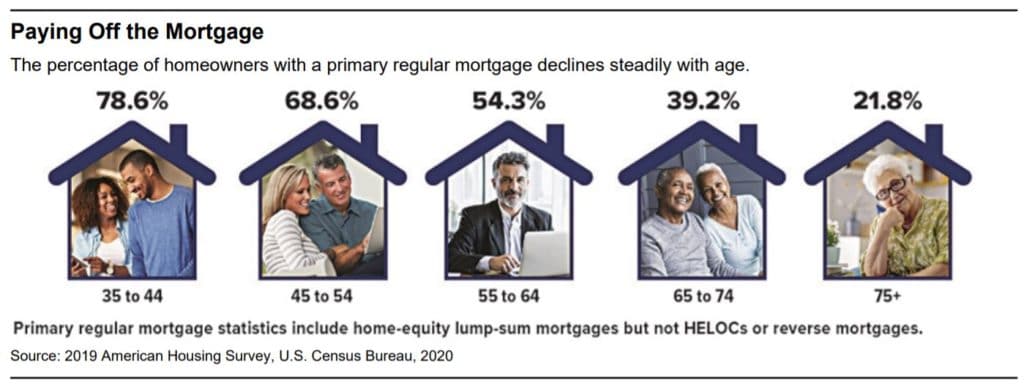Buying a home is a long-term commitment, so it’s not surprising that older Americans are much more likely than younger people to own their homes “free and clear” (see chart). If you have paid off your mortgage or anticipate doing so by the time you retire, congratulations! Owning your home outright can help provide financial flexibility and stability during your retirement years.
Even if you still make mortgage payments, the equity in your home is a valuable asset. And current low interest rates might give you an opportunity to pay off your home more quickly. Here are some ideas to consider.
Enjoy Lower Expenses
If you are happy with your home and don’t need to tap the equity, living free of a monthly mortgage could make a big difference in stretching your retirement dollars. It’s almost as if you had saved enough extra to provide a monthly income equal to your mortgage. You still have to pay property taxes and homeowners insurance, but these expenses are typically smaller than a mortgage payment.
Consider Downsizing
If you sell your home and purchase another one outright with cash to spare, the additional funds could boost your savings and provide additional income. On the other hand, if you take out a new mortgage, you may set yourself back financially. Keep in mind that condominiums, retirement communities, and other planned communities typically have monthly homeowners association dues. On the plus side, these dues generally pay for maintenance services and amenities that could make retirement more enjoyable.
Paying Off the Mortgage
The percentage of homeowners with a primary regular mortgage declines steadily with age.

If you stay in your home and want money for a specific purpose, such as remodeling the kitchen or fixing the roof, you might take out a home-equity loan. If instead you’ll need to access funds over several years, such as to pay for college or medical expenses, you may prefer a home-equity line of credit (HELOC).
Home-equity financing typically has favorable interest rates because your home secures the loan. However, you are taking on another monthly payment, and the lender can foreclose on your home if you fail to repay the loan. In addition, you may have to pay closing costs and other fees to obtain the loan. Interest on home-equity loans and HELOCs is typically tax deductible if the proceeds are used to buy, build, or substantially improve your main home, but is not tax deductible if the proceeds are used for other expenses.
Refinance
With mortgage rates near historic lows, you might consider refinancing your home at a lower interest rate. Refinancing may allow you to take some of the equity out as part of the loan, but of course that increases the amount you borrow. While a refi loan may have a lower interest rate than a home-equity loan or HELOC, it might have higher costs that could take some time to recoup. And a new loan comes with a new amortization schedule, so even with lower rates, a larger portion of your payment may be applied to interest in the early years of the loan. Refinancing might be a wise move if the lower rate enables you to pay off a new mortgage faster than your current mortgage.
If you have questions or need assistance, contact the Experts at Henssler Financial:
- Experts Request Form
- Email: experts@henssler.com
- Phone: 770-429-9166
Disclosures: The following information is reprinted with permission from Forefield, a division of Broadridge Financial Solutions, Inc. The investments referenced within this article may currently be traded by Henssler Financial. All material presented is compiled from sources believed to be reliable and current, but accuracy cannot be guaranteed. The contents are intended for general information purposes only. Information provided should not be the sole basis in making any decisions and is not intended to replace the advice of a qualified professional, such as a tax consultant, insurance adviser or attorney. Although this material is designed to provide accurate and authoritative information with respect to the subject matter, it may not apply in all situations. Readers are urged to consult with their adviser concerning specific situations and questions. This is not to be construed as an offer to buy or sell any financial instruments. It is not our intention to state, indicate or imply in any manner that current or past results are indicative of future profitability or expectations. As with all investments, there are associated inherent risks. Please obtain and review all financial material carefully before investing. Henssler is not licensed to offer or sell insurance products, and this overview is not to be construed as an offer to purchase any insurance products.








